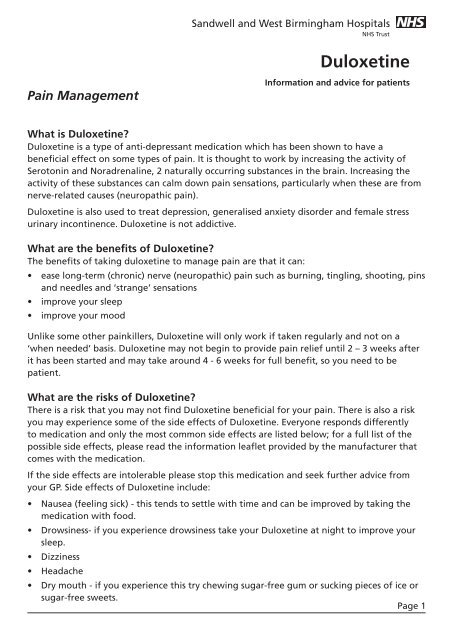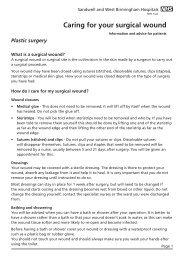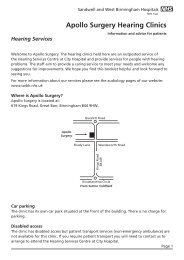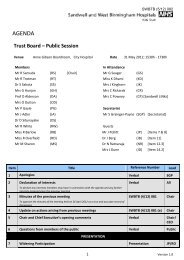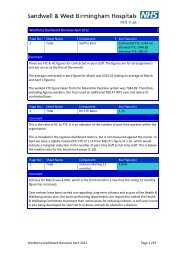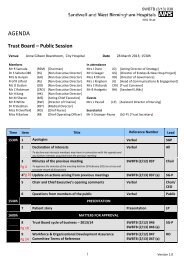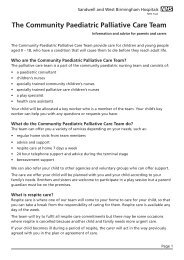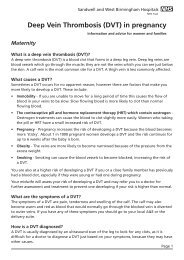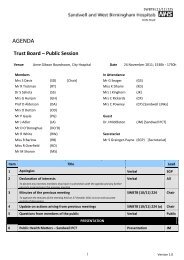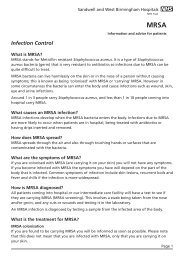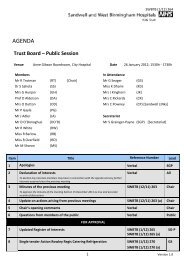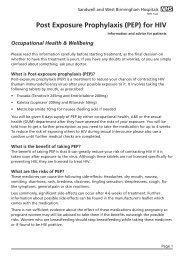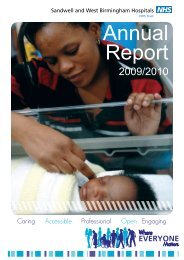Duloxetine - Sandwell & West Birmingham Hospitals
Duloxetine - Sandwell & West Birmingham Hospitals
Duloxetine - Sandwell & West Birmingham Hospitals
Create successful ePaper yourself
Turn your PDF publications into a flip-book with our unique Google optimized e-Paper software.
Pain Management<br />
<strong>Duloxetine</strong><br />
Information and advice for patients<br />
What is <strong>Duloxetine</strong>?<br />
<strong>Duloxetine</strong> is a type of anti-depressant medication which has been shown to have a<br />
beneficial effect on some types of pain. It is thought to work by increasing the activity of<br />
Serotonin and Noradrenaline, 2 naturally occurring substances in the brain. Increasing the<br />
activity of these substances can calm down pain sensations, particularly when these are from<br />
nerve-related causes (neuropathic pain).<br />
<strong>Duloxetine</strong> is also used to treat depression, generalised anxiety disorder and female stress<br />
urinary incontinence. <strong>Duloxetine</strong> is not addictive.<br />
What are the benefits of <strong>Duloxetine</strong>?<br />
The benefits of taking duloxetine to manage pain are that it can:<br />
• ease long-term (chronic) nerve (neuropathic) pain such as burning, tingling, shooting, pins<br />
and needles and ‘strange’ sensations<br />
• improve your sleep<br />
• improve your mood<br />
Unlike some other painkillers, <strong>Duloxetine</strong> will only work if taken regularly and not on a<br />
‘when needed’ basis. <strong>Duloxetine</strong> may not begin to provide pain relief until 2 – 3 weeks after<br />
it has been started and may take around 4 - 6 weeks for full benefit, so you need to be<br />
patient.<br />
What are the risks of <strong>Duloxetine</strong>?<br />
There is a risk that you may not find <strong>Duloxetine</strong> beneficial for your pain. There is also a risk<br />
you may experience some of the side effects of <strong>Duloxetine</strong>. Everyone responds differently<br />
to medication and only the most common side effects are listed below; for a full list of the<br />
possible side effects, please read the information leaflet provided by the manufacturer that<br />
comes with the medication.<br />
If the side effects are intolerable please stop this medication and seek further advice from<br />
your GP. Side effects of <strong>Duloxetine</strong> include:<br />
• Nausea (feeling sick) - this tends to settle with time and can be improved by taking the<br />
medication with food.<br />
• Drowsiness- if you experience drowsiness take your <strong>Duloxetine</strong> at night to improve your<br />
sleep.<br />
• Dizziness<br />
• Headache<br />
• Dry mouth - if you experience this try chewing sugar-free gum or sucking pieces of ice or<br />
sugar-free sweets.<br />
Page 1
Pain Management<br />
<strong>Duloxetine</strong><br />
Information and advice for patients<br />
What are the risks of not taking <strong>Duloxetine</strong>?<br />
The only risk of not taking <strong>Duloxetine</strong> is that you won’t experience the benefits it can give.<br />
What are the alternative treatments?<br />
There are a variety of other medications that can be used for nerve pain if <strong>Duloxetine</strong><br />
is not successful or you do not wish to use it. For information about suitable alternative<br />
medications please speak to your doctor.<br />
Before taking <strong>Duloxetine</strong><br />
Before taking this medication please let your doctor or nurse know if you have any heart<br />
problems, uncontrolled blood pressure, raised intra-ocular pressure or a susceptibility to<br />
angle-closure glaucoma, a history of seizures or if you are pregnant or breastfeeding as<br />
this medication may not be suitable for you. You should also inform them of any other<br />
medications, including herbal remedies, you are taking.<br />
Please make sure you read the manufacturer’s information leaflet that comes with your<br />
<strong>Duloxetine</strong> before taking it.<br />
How to take <strong>Duloxetine</strong><br />
It is best to take <strong>Duloxetine</strong> at night and swallow it whole – do not open, break or chew the<br />
capsule. <strong>Duloxetine</strong> can be taken with or without food but some people find that taking it<br />
with food can help to reduce any initial nausea that may occur.<br />
How much <strong>Duloxetine</strong> should I take?<br />
Most people are prescribed one tablet of <strong>Duloxetine</strong> per day to start with. If necessary you<br />
may be advised to increase this dose after a few weeks. Do not take a higher dose than you<br />
have been prescribed.<br />
If you forget to take a dose one evening do not worry, skip the missed dose and then<br />
continue with your normal daily dose as usual.<br />
You will be given an initial 4 week prescription and we will write to your GP so that they can<br />
continue prescribing <strong>Duloxetine</strong> if it suits you, so make sure you get an appointment with<br />
them before your medication runs out.<br />
Precautions<br />
• Please make sure all health professionals seeing you are aware of any medication that you<br />
take, including herbal remedies.<br />
• Make sure all medications are stored safely and out of sight of children.<br />
• Check the expiry date of your medication before using it.<br />
Page 2
<strong>Duloxetine</strong><br />
Pain Management<br />
Information and advice for patients<br />
Contact details<br />
If you have any questions or concerns please contact Pain Management Services on:<br />
0121 507 4344/ 5602<br />
Monday – Friday, 9am - 4pm<br />
If you have any problems outside these times, or are experiencing severe side effects, please<br />
contact your GP.<br />
Further information<br />
For more information about our hospitals and services please see our website www.swbh.<br />
nhs.uk or follow us on Twitter @SWBHnhs.<br />
Sources used for the information in this leaflet<br />
• British National Formulary 64, Section 6.1.5 ‘Treatment of diabetic nephropathy and<br />
neuropathy’, September 2012<br />
• British National Formulary 64, Section 4.3.4 ‘Other antidepressant drugs: <strong>Duloxetine</strong>’,<br />
September 2012<br />
• Cochrane Database of Systematic Reviews, ‘<strong>Duloxetine</strong> for treating painful neuropathy or<br />
chronic pain’, October 2009<br />
If you would like to suggest any amendments or improvements to this leaflet please contact the<br />
communications department on 0121 507 5420 or email: swb-tr.swbh-gm-patient-information@nhs.net<br />
A Teaching Trust of The University of <strong>Birmingham</strong><br />
Incorporating City, <strong>Sandwell</strong> and Rowley Regis <strong>Hospitals</strong><br />
© <strong>Sandwell</strong> and <strong>West</strong> <strong>Birmingham</strong> <strong>Hospitals</strong> NHS Trust<br />
ML3561<br />
Issue Date: October 2012<br />
Review Date: October 2014<br />
Page 3


